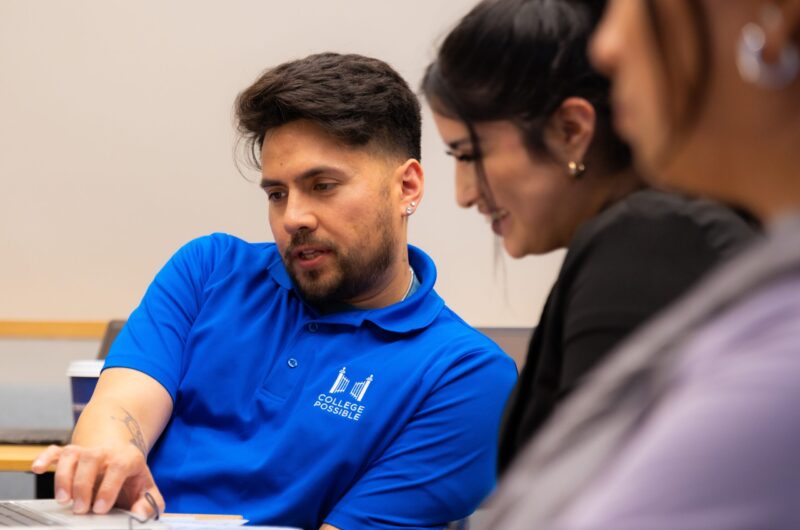Helping students navigate financial aid and paying for college is a popular coaching session at College Possible. No matter where you are on your post-secondary journey, we know financial concerns are top of your mind. To help you with some of those questions, and help you navigate this conversation with your College Possible coach, we have compiled the frequently asked questions below.
Additionally, If your aid award doesn’t cover all of your expenses, we included a sample financial aid appeal letter. You can use it as you navigate the financial aid appeal process with your financial aid officer or an appropriate school representative.
Financial aid FAQ’s
Financial aid helps students pay for college. Financial assistance covers educational expenses including tuition and fees, room and board, books and supplies, and transportation. There are several types of financial aid, including scholarships, loans, grants, and work-study.
In order to receive financial aid from a postsecondary institution, you must first complete the FAFSA (Free Application for Federal Student Aid) or TASFA (Texas Application for State Financial Aid).
The FAFSA is an online application that sends you and your parent’s info to schools in order for them to decide how much money you need for school. Many colleges also require the FAFSA to determine eligibility for other types of financial assistance. The information provided on the FAFSA is used to determine your expected family contribution (EFC).
You are automatically applying federal and state aid when you fill out the FAFSA form. The FAFSA can be found at www.fafsa.ed.gov.
You will fill out the FAFSA if you are a:
- US citizen
- Permanent US resident with Alien Registration Card (I-55)
- Noncitizens with Arrival/Departure Cards (I-94)
- Refugee, Asylum Granted, Parolees (for a min, one year), Cuban-Haitian entrants
Q: What is TASFA? Do I need to fill out both?
In order to receive financial aid from a postsecondary institution, you must first complete the FAFSA (Free Application for Federal Student Aid) or TASFA (Texas Application for State Financial Aid). The TASFA is a paper application used to determine state aid eligibility for Texas residents who are not eligible for federal aid.
TASFA is only for state aid and for those that don’t qualify to submit a FAFSA. Higher education institutions use TASFA and its corresponding documents to determine eligibility and disperse state aid. The TASFA can be found at CollegeForAllTexans.com.
You will fill out the TASFA if:
-
-
- You don’t meet the requirements for FAFSA
- Are a Texas Resident (i.e. you lived in Texas for three years before graduating from high school or receiving GED certificate)
-
Q: Do parents need to file the FAFSA/TASFA every year?
The FAFSA/TASFA must be filled out every year by either you or parents with necessary tax info. Financial aid award letters are for one year and are broken down by semester.
In most cases, you will need to provide your parents’ financial information on the FAFSA/TASFA unless you are deemed an “independent” student. If you have questions, refer to http://studentaid.gov/dependency or contact your CoFo Coach or Coordinator.
Q: How do I understand my financial aid award letter?
Financial Aid Award letters from school can be tricky to decipher sometimes. We suggest contacting your CoFo Coach or Coordinator to read through them with you. Letters can differ in the language they use, but here are some things to look for, as well as some tips and tricks.
Q: Will my Financial Aid change if I choose a Pass/No Pass or Credit/No Credit option?
- If you choose to take a class pass/no pass or credit/no credit rather than receiving an A-F grade, this should not impact your financial aid. Talk to your financial aid office if you are considering dropping a class, or if your school canceled your class.
Q: What if I don’t get enough money from financial aid?
You can appeal if you believe that your financial need is greater than what your college or university offered. We have created a sample appeal letter for you to use when appealing. Download a copy of this letter, fill it out with your information, and save it as a .pdf file to attach to the email you send to your financial aid office.
COVID-19 and financial aid questions
If you are experiencing financial hardships related to COVID-19, you should contact your financial aid office ASAP to ask what options are available to you.
Contact your financial aid office ASAP, by phone or email, to ask this question. Schools have emergency funds available to support students in this situation. You will likely need to complete a form and describe your situation to receive these emergency funds.
Q: What if I need immediate assistance for moving, rent, food, or medicine?
Your financial aid office can help with this too! Call or email their financial aid office to ask this question. The CARES Act emergency funds are available to support students in this situation too. You will likely need to complete a form and describe their situation to receive these emergency funds.
Q: What if my family’s financial circumstances have changed due to COVID-19?
Students experiencing this change should file a special circumstances appeal with their financial aid office ASAP. A special circumstances appeal allows the school to assess your financial aid and make adjustments to your financial aid package. Most institutions will have a form that you can complete to describe your situation. Financial aid officers will be available to help.
Q: I did not file for financial aid for this academic year (2019-2020), but now I need to.
You can file a FAFSA or TASFA for the 2019-2020 academic year until June 30, 2020. Contact your financial aid office ASAP to let them know that you are applying for aid. Ask them what additional steps you need to take beyond submitting a FAFSA or TASFA.
Q: I worked on campus. What will happen to my job?
You should contact your supervisor directly.
Q: I am a work-study student employee. Am I still eligible to work and receive payment?
Institutions have the option to continue paying Federal Work-Study wages. This applies even if you can no longer perform your duties. Contact your supervisor and the financial aid office to ask about pay continuation.
You should be able to submit documents through your online student portal. If you are unsure how to do this, call the related office. Please, do not use email to send your social security number or other confidential information.
Q: Will I receive any tuition or fees refunds now that my classes are going online?
It does not seem like any schools are offering any refunds for classes that switch to an online format. If your school cancels your class, you should inquire about a refund.
Q: Will I receive a refund for housing, dining, parking, or program-related cancelations?
Yes, students should be receiving refunds for most of these costs at most campuses. Contact the appropriate department to inquire about the process. The departments might include:
-
- Financial Aid
- Housing
- Parking and Transportation
- Their specific program lead or college dean’s office
Q: I have a financial hold on my account, can I register for Summer or Fall 2020 courses?
If you have financial holds on your account you should contact your financial aid office. You will very likely be able to register for the summer and fall 2020 courses despite having a hold on your account.
Now it’s your turn
Complete the “Identifying Financial Aid Resources Worksheet” to find aid resources on your campus.
Financial aid appeal template
Download a copy of this letter, fill it out with your information, and save it as a .pdf file to attach to the email you send to your financial aid office. Download Appeal Letter Template



